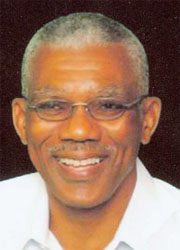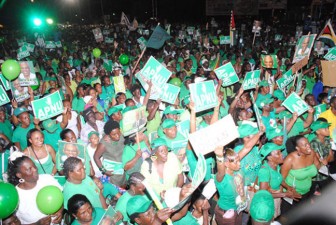Guyana Review: Is A Partnership for National Unity now satisfied that the controversies that arose out of last November’s general elections are behind us?
Granger: APNU’s sole demand has been for the ‘Statements of Poll’ to be used as the sole bases for the computation and declaration of the results of the elections. APNU is convinced that the position it adopted on 1st December 2011 to demand the verification of the SOPs was correct. It forestalled a major miscarriage which may have resulted in an erroneous ‘Declaration of the Results’ that would not have been based entirely on the SOPs. That could have had nightmarish consequences.
The Partnership has since consulted with the Electoral Assistance Bureau; has conducted an independent verification of the scanned SOPs and has communicated with the Guyana Elections Commissions iterating its original demand to examine the original, not copied, SOPs. Two months after the general elections, GECOM has failed to present the original SOPS for examination; we made it clear that we were dissatisfied with copies. The answer to your question is that APNU is not yet satisfied that GECOM has fully discharged its public duty.

Guyana Review: The choice of Speaker of the National Assembly appeared to be the first major post-elections political controversy to arise. How much of an impact do you think that is likely to have on (a) the hoped-for effectiveness of a parliamentary opposition and (b) relations between the government and the opposition, given the fact that the government has now hinted at the possibility of going to the polls again.
Granger: APNU, AFC and PPPC each proposed candidates for the speakership. APNU set out the principles for selection to prevent the matter from degenerating into a popularity contest or being serialised as a soap opera in the press. We separated principles from personalities. There was hard bargaining for several weeks until the day before the election when two candidates withdrew.
The effect has been that both the AFC and PPPC are more aware of the fact that APNU’s decisions are based on principles. This, we feel, is the best basis for future relations. Our policies are not determined by fear of the prospect of new elections. We want to build consensual relations based on mutual respect within a tripartite framework.
Guyana Review: Can we now assume – at least as far as you are aware – that, given the differences that arose between the opposition parties on the matter of the election of the Speaker, we now have a united opposition?
Granger: Bi-partisan relations – by which I mean APNU-AFC relations – need to be moved from the current ad hoc level. Unification is not contemplated at this stage but we are working on a ‘concordat’ which could be the basis for continuous cooperation on matters of mutual interest. This will help both parties to achieve the common objective of fulfilling the expectations of the more than 175, 000 electors who voted a change in government. APNU’s purpose in cooperating with the AFC is not necessarily unity for the sake of unity. We see it as a duty…as the best means of fulfilling our obligation to the public.
Guyana Review: For the first time in the country’s post-independence history, we have a government that has a minority in the National Assembly. Does that fact, in your opinion, portend some longer-term change in our political culture?
Granger: Yes, 28th November 2011 changed everything. It suppressed, but did not destroy, the ‘winner-takes-all’ incubus that had oppressed local politics for the past 50 years. It has given Guyanese citizens hope to face the future. The real prospect is that a platform for cooperation rather than confrontation among the three main parties – APNU, AFC and PPPC – can be erected in order to advance the legislative agenda.
Political culture cannot change overnight but a start has been made. The PPPC still seems not to have understood that fact.

Guyana Review: As leader of the majority in the National Assembly, have you any thoughts on how your leadership might help re-shape the political landscape?
Granger: I have a very clear vision of the future. We saw that the people themselves initiated the process of transforming the political landscape on 28th November 2011. I have a two-fold mission; The first will be to establish the constitutional ‘Office of Leader of the Opposition’ in a manner that is more accessible to the common people. It should be located in a public place and not in a political party headquarters. The majority of the electorate voted for the two Opposition parties and the role of the Office of the Leader of the Opposition will be to ensure that their voices are heard. My Office will have the task of demystifying the work of the National Assembly.
Second, as I have said elsewhere, I shall work with the Opposition majority “to bring about real change in the country’s political culture, to rekindle the spirit of parliamentary democracy and to re-establish the supremacy of the legislative branch.” I have already convened a ‘shadow cabinet’ that has been given a charge to “promote democracy, prevent abuse, protect the people’s interest and provide a good life for all Guyanese.” APNU’s goal is to realise the aspirations of the Guyanese people for a better life.
Guyana Review: APNU comprises several different political parties. Is there likely to be a process of absorption of the others into the PNCR or will it remain a loose coalition for purposes of the National Assembly only?
Granger: APNU’s vitality lies in its diversity. Each partner brings unique talents and constituents to the group and therein is our strength. It would be a strategic error for any partner to attempt to induce members to migrate from one party to another. It would defeat the purpose of our existence if our relations degenerated into a dog-eat-dog brawl instead of moving forward together to reach out to the nation at large. APNU, only 5 months after its birth, proved to be an effective organisation at the general and regional elections. Our aim is to strengthen the partners’ representational capabilities in their respective constituencies and to improve the bases for collaboration. There is no desire to smother the identities of the individual components.
Guyana Review: The PNCR would appear still to be an independent political force in Guyanese politics. What are your thoughts on the present state of the PNCR? Do you think that issues of its reorganization and its leadership still remain to be settled?
Granger: The PNCR – which celebrates its 55th anniversary this year – remains an independent and important force in local politics. The PNCR has functioning institutions – Constitution, Congress, General Council and Central Executive Committee. Our national, regional and group structure is effective and, when the time comes, the leader of the party will be elected in the normal way as it has done for decades – at Congress. It has recovered from the damage done by a few dissidents and defectors. The broad membership never abandoned the party – as we witnessed on 28th November. The PNCR’s tasks are to continue to strengthen party unity, increase its mobilisation especially among youth and, thereby, contribute to consolidating the foundation of APNU.
Guyana Review: You have met and held discussions with President Donald Ramotar on more than one occasion. Have those discussions caused you to draw any conclusions regarding the likely quality of the relationship between his administration and the opposition?
Granger: Mr Donald Ramotar is very affable and accessible but it may be too early to predict how our relationship will develop. His political career – as a student in the Soviet Union; as a magazine correspondent in Prague, Czechoslovakia; as manager of the party headquarters and as party general secretary during the oppressive Jagdeo regime – must have influenced his world view in a certain way. His political experience suggests that his outlook might be less as an agent of change than as a conservative party apparatchik.
The PPP’s ideology over the last four decades has been derived, largely, from its adherence to the retrograde, Soviet-era model of ‘democratic centralism.’ It has relied on an outmoded model of electoral majoritarianism and statism. Now that the Opposition has won the majority, the PPPC has become delusional and seems to have lost touch with reality. It is a minority but imagines that it can behave as a majority. There seems to have been no hint of acceptance of the principle of ‘inclusionary democracy’ as prescribed in the Constitution.
My meetings with Mr Ramotar since 1st December 2011 have been cordial. I have not perceived, however, any sign of a shift towards accepting the new political reality in Guyana.





